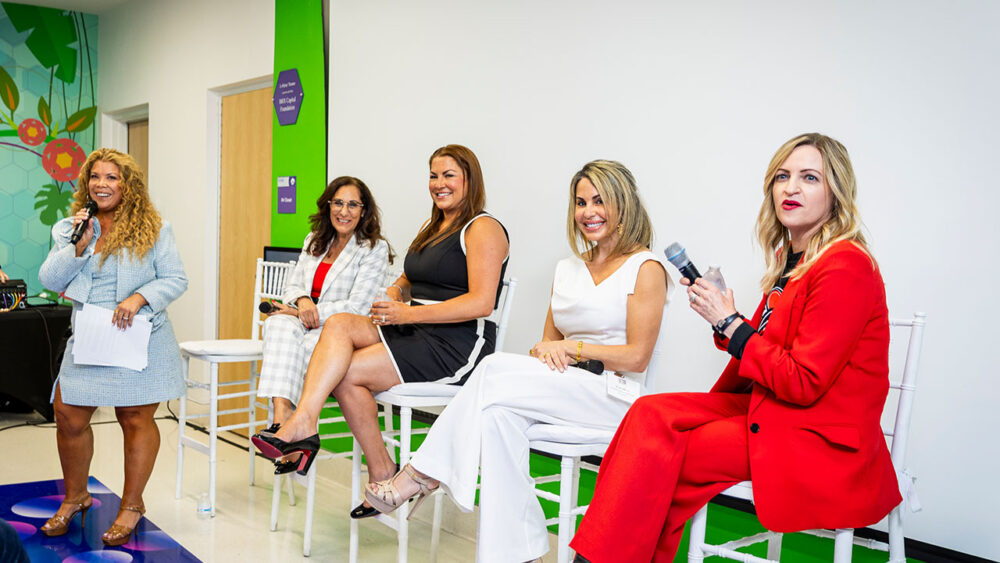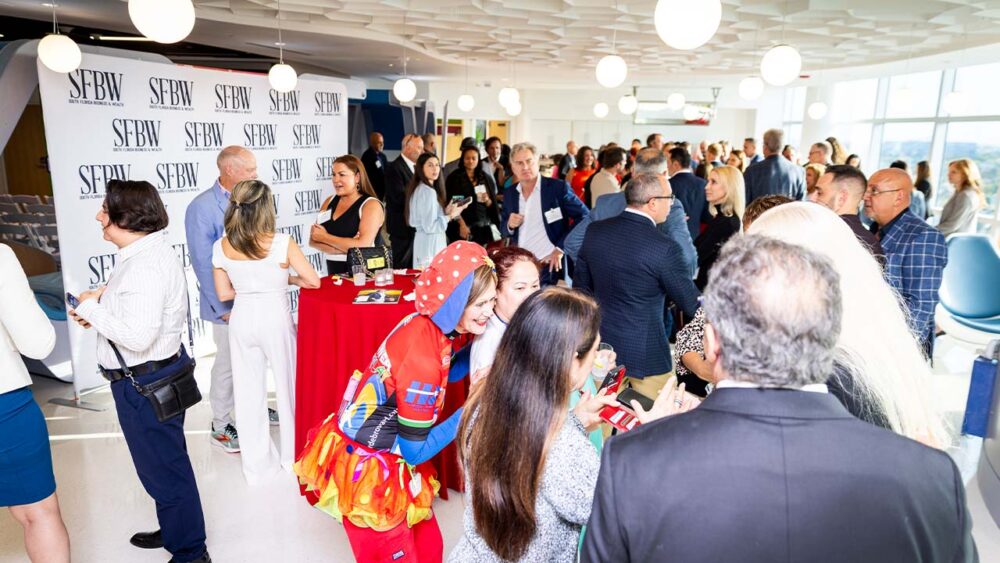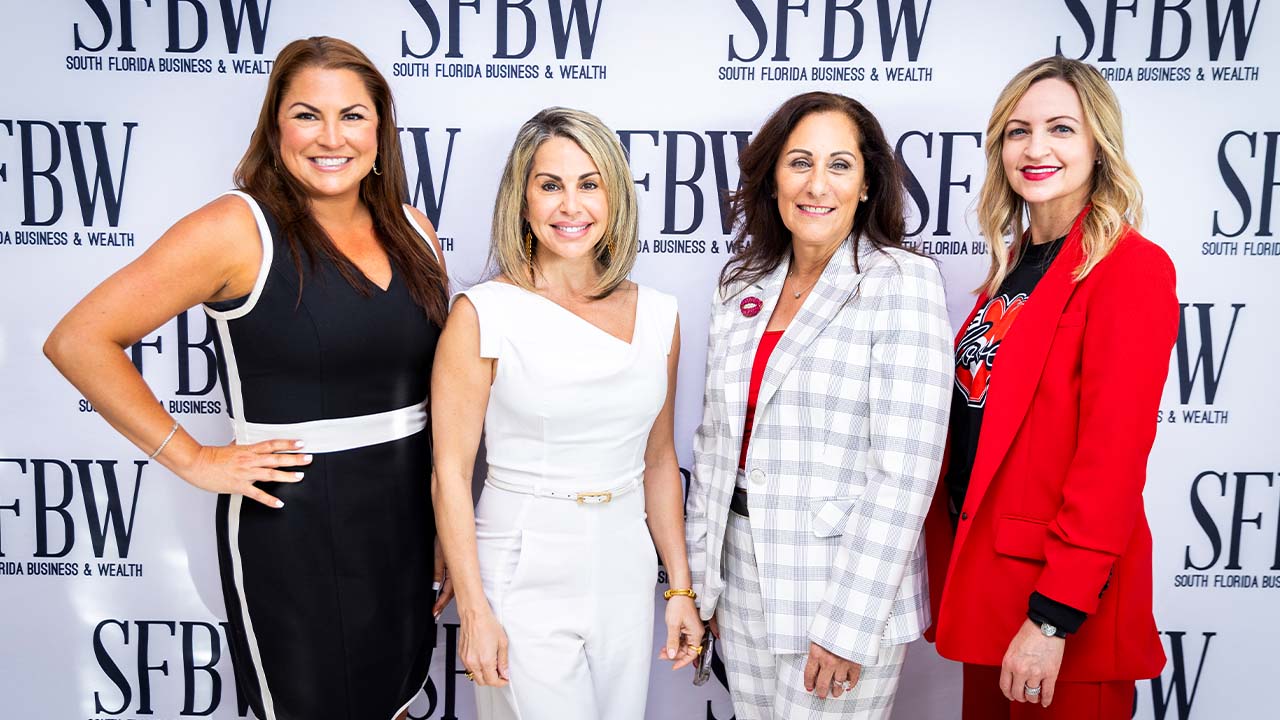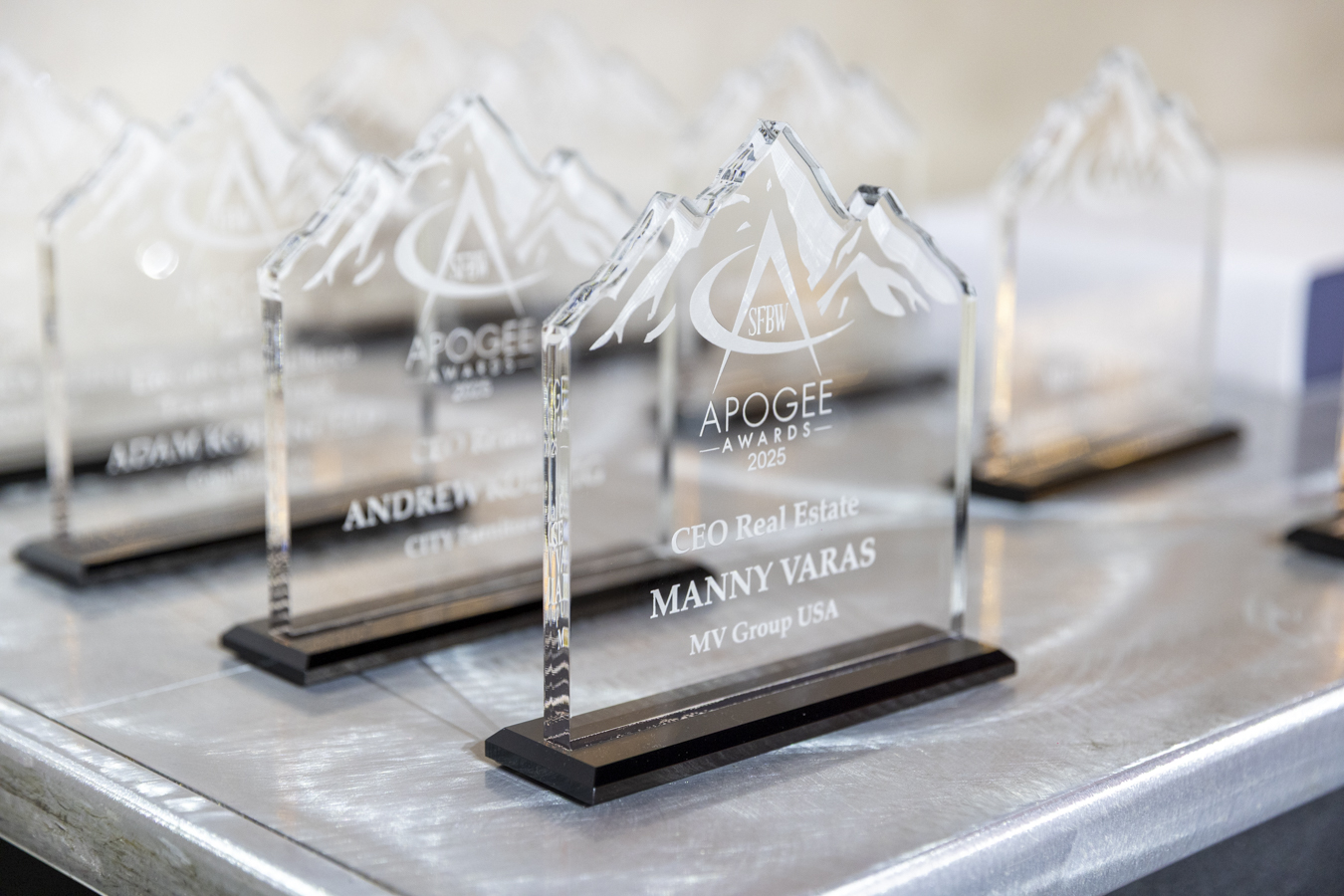SFBW marked Women’s History Month with a lively CEO Connect panel discussion called On the Heels of Success. The panel of four high achievers offering insights into their careers, leadership styles and advice on mentoring included:
Laurie Sallarulo, president and CEO of Junior Achievement of South Florida, teaches 80,000 students yearly about financial literacy, entrepreneurship, and work readiness. JA World in Coconut Creek includes storefronts where children can role-play and learn about the world of business.
Robyn Raphael Dynan, president and CEO of RCC Associates, a 53-year-old construction company specializing in the restaurant hospitality industry and operating in 30 states. The business was started by her father and continued by her mother.
Dr. Ann Monis, a clinical and forensic psychologist who is president and CEO of Transformative Healthcare Solutions and founder of the nonprofit Florida Mental Health Coalition. Transformative Healthcare has offices in Fort Lauderdale, Tampa, Orange City and Jacksonville. She is also the CEO and founder of Medical Anti-Aging in Fort Lauderdale.
Caitlin Stella is CEO of Joe DiMaggio Children’s Hospital in Hollywood, which delivers 16,000 babies and treats 375,000 patients a year. It has three NICUs and three emergency departments. It has locations in Pembroke Pines, Miramar, Plantation, Tamarac, Weston, Coral Springs, Boca Raton and Wellington.

The event was held in the Garth Brooks Teammates for Kids Child Life Zone at Joe DiMaggio. The zone is a state-of-the-art, therapeutic play area and sanctuary where pediatric patients and their families can play, learn, laugh and relax with age-appropriate activities.
The panel was moderated by Kim Sarni, managing director of SFBW, and Kevin Gale, SFBW group editor-in-chief. Members of the audience also asked questions. The following transcript has been edited for clarity and brevity.
It seems like there is still a challenge for women. If a man is assertive, well, that’s just being a guy. If a woman is assertive, the B word can sometimes get lobbed your way. How do you deal with this?
Sallarulo: It could be the B word, it could be the R word—relentless. It can be an A word— aggressive. I think we’ve all heard pretty much almost any adjective. You can’t let it get under your skin, as long as you are doing things the right way for the right reasons.
Raphael: I’m in a pretty male-dominated industry and it’s taken many, many years to get people used to seeing my face as well as other women who worked at RCC and in different construction companies. I do see a change. I feel like a lot of people are warming up to the idea that we have a seat at the table—we’ve earned it, we deserve it.
Monis: So, being in mental health, it’s probably not quite that way. We do have a lot more female therapists. In the anti-aging world, also, you’re looking at women and there’s your doctors or estheticians. But when you get to that CEO seat, no matter where you are, it’s more male-dominated just in general. So, my answer is, yeah, I’m assertive or aggressive or whatever, but you still have to do what I say.
Stella: I think you’re never going to please everyone. You might never please anyone, but you have to stick to what is right and what you know you need to do. I’m the steward of the public’s hospital. This is the children’s hospital, it’s their hospital. So, I’m responsible for and accountable to them. If we’ve got to make changes or we’ve got to do hard things, I mean it’s not fun. That’s why people say it’s lonely at the top because you’re dealing with things that aren’t always fun.
Sallarulo: I love sports and I love Dion Sanders. I just love his confidence and he has a saying that has become my mantra: “Don’t let my confidence offend your insecurities.” I think if we really dig down deep on why do people call us the B word or the R word or the A word, it’s typically because they’re jealous, they’re insecure. If they’re not doing their job, they feel like, well, she did that and why didn’t I do it? And she’s getting the credit or whatever it is. I think if we understand where it’s coming from, it’s a little easier to take it. You can’t let it shake you. You have to just be who you are, do you, and move on. I must say one thing: I have lots of children in my life, not just here, but in my own personal life. I do think it’s important to shift the narrative. So, in my own home people will say, oh, she’s tough, she’s bossy. And I’m like, those are leadership goals. My husband’s said that she’s not bossy, she’s leading. So, I think it’s on all of us to really shift that and stop thinking of it as a negative quality. You want a little girl who’s going to stand up for herself and you want a little girl who’s going to protect herself.

Describe your leadership style. Is it different from your male counterparts?
Raphael: Mine is definitely different. I have to lead a different way when I’m leading as a woman president and leader of a very male-dominated staff. A lot of it is psychology. I see how the past male leaders in our company did things and it didn’t always get them the result that they want. So, I have learned how to kind of go a different way and it’s been a little bit more successful. Sometimes you just have to help make it their idea.
Sallarulo: The truth is the truth. Mike, my partner for 20 years, and I have this conversation a lot about what happens during the day and we share situations that are going on in the workplace. And sometimes he’ll have a much different approach than I might. He’ll take the hardcore approach—that person needs to be gone, right? And I’m like, well, maybe we can work with them and there’s some coaching we can do, because I always want to see the best in people. Not that he doesn’t, but I think women have a lot more patience sometimes and we want to make sure we’ve done everything we can do to develop that person.
But I also think it isn’t just about comparing us with men. When I grew up in the business world, it was a very different place. It was all about results. That’s all they cared about. We didn’t have a seat at the table. We didn’t get to have the input into the strategic plan. It was “here’s what you’re going to do and you need to get it done by this time. Figure it out.” I’ve had to shift my leadership style over the last 10 years to being more people-focused. Over the years, little by little, I’ve shifted, and you have to have that balance. It can’t just be people and can’t just be results
How did you navigate power struggles earlier in your career versus having to deal with them later on in your career?
Stella: The earliest part of my career was in an academic medical center where you’re around faculty and there are a lot of politics. And then when I went to PWC and I was in a corporate environment. I was a healthcare consultant in a national healthcare practice. It’s a very different setup. So, you have a lot as a young woman in business working your way up in a national corporate entity. It was challenging. And I have to say guidance from others was key—a lot of mentors, whether they were women or men, it didn’t matter. I just took advice from a lot of people about how to navigate certain situations, but you’re new in your career and you don’t want to make the wrong step and you don’t want to burn bridges. I think now the older we get, I hate to say this, but you kind of earned your way up and you’ve made the mistakes and you’ve scraped your knees and you’ve earned your stripes and all those cliches. And, so, I think that navigating it now, I think I have a little more confidence not only to do it on my own, but to guide other people.
Monis: I think I’ve started to focus on the hypothetical versus realistic. Earlier in my career I was worried about maybe what people might think and making sure that they know that I know and wanting them to respect me. And over time I’ve learned that it doesn’t matter if you hypothetically agree or don’t agree. I have to execute this plan. Whether you are hypothetically pleased or not, I’m going to have to do it. Yes, I would love to have as much cooperation as possible, but I call myself the janitor a lot of time. “What do you do?” Oh, I’m the janitor because it is my turn to be the cleanup crew and make sure that everyone’s getting what they need.” When you’re forward facing, it might not be something that looks that way all the time, but it is your responsibility to make sure that all of those hard decisions are executed and that people don’t later have to suffer the consequence of not executing those decisions.
Sallarulo: I used to think that sometimes from experience and just things we’ve been through, we really do know the right answer and we know how it should get done and how it should be done. But you have to let people get there. And I think at one time I felt like I had to just say, “No, this is the way we need to do it.” And I had to convince them that this is the way we do it. Now, I let them go and start asking some questions and eventually, hopefully, they get to where they realize that that’s the way you have to do it. I don’t always do that perfectly. There are times where it just gets a little frustrating and I just don’t have that much time left in my life. The power struggle was almost always with myself and with the people around the table of guys. Please don’t waste my time. This is how we have to do it. I know this is how we have to do it, but sometimes that doesn’t always work.
Raphael: I think for me, especially in construction, coming from a world where it’s a lot of screamers and yellers. We were kind of laughing about it today in the office and comparing the way that we run things compared to maybe a big high-rise construction firm where if you make a mistake, they are immediately screaming at you, the whole thing. We don’t operate that way. It’s a softer approach. I try and keep my cool 99% of the time so that when I need to make an impact or when somebody needs to know that I’m serious about something or I’m upset about something, it has a bigger impact. I’m not a big fan of freaking out about everything. Nobody knows when there’s a real emergency. As the leader, you have to stay as calm as possible. That way everyone else stays calm with you.
When you were early in your careers, did you envision yourself being a leader? Was there something that might have motivated you? Was there a mentor who played a key role?
Sallarulo: No. If you would’ve told me I would be the CEO of anything, I wouldn’t have figured that one out. That would be it, because I didn’t think that was my aspiration. But, actually, from the time I was two or three, I was wearing my mom’s high heel shoes and I was a bossy bitch.
I think I always knew that I would lead people. I knew that it would always be about making a difference because those were the things that inspired me and made me happy when I was doing ’em.
I think, while I didn’t aspire to be a CEO, I did aspire to be a boss of some sort; but I’m glad that I didn’t have that path that was so rigid that I’m going to be this and that’s it. I knew what I liked and what I didn’t like, and it kind of led me from one opportunity to the other, always making sure that I stood out, that I did the best I could. My father always said, “step up, stand out,” all those things. How am I different than somebody else?
Monis: It’s a work ethic I think that you’re describing, right?
Raphael: I definitely did not think I would ever go into my family business. Construction was not a dream as a little girl. I kind of remember being like, “hell no,” when they would ask, and now I’m doing it to my own kids, and they’re like, “hell no. Leave me alone.” They were just arguing with me last night. I said, “It’s such a great company, you guys would love it.” It’s all the same stuff my parents said to me, but some of you guys might not know. My dad started it and he passed away at a very young age. He was only 53. My mom stepped in and kept the company going, and then I joined her when I graduated from college. So, it’s more than just a business. It’s keeping my dad’s legacy alive and keeping everything going. But my mom is the one who pushed me. Every time I would say, “no, I don’t want to do that,” she would tell me, “you’re doing it.”
How do you inspire the younger generations?
Monis: I have two boys, and three years ago, my oldest son filled out an inventory about his mom. Where it asked, “What does your mom do?” he wrote, “She works for my dad.” I fell out of my seat. I was like, oh, no, no, no! I decided that I had to change my tactics, right? Because I was being a little too accommodating. So, I’ve started bringing them every so often to just see what it is that’s happening. Recently I’ve been making them solve problems for us. I’ll ask, “Well, if you were to lead this and this was your project, how would you fix this for Mommy?” And they have to pitch you ideas. And now my 8-year-old goes, “Mom, pitch me!” I don’t want them to rely on the fact that I am a leader and I can be a dictator because we know what’s right, but rather kind of inspire that independent thought process to tell me to buzz off sometimes.
Raphael: I’m struggling with this, to be honest with you because I have a 16-year-old daughter. I thought she was watching me all these years and going, “Oh, I’m going to be just like my mom.” I’ve asked, what do you want to be when you grow up? She’s said, “I want to travel and be an influencer.” When she was little, she would love “The Shark Tank” and pitch me with a lot. Now I sometimes feel like my kids see me stress about work and they’re like, “Oh, that’s stressful. I wouldn’t want to do that.” So, I’m really having a lot of hard conversations with them saying, “What job do you think you’re going to do that’s going to support this lifestyle that you guys love so much? You can’t be dependent on anybody else, but yourself.” I learned that pretty young. So, they’re just hard conversations and I’m having them now that they’re older and they really kind of see the light—college on the horizon and all of that.
Sallarulo: If it’s any consolation, she’s 16, my daughter’s 29—better. She now wants to be the woman that I am today. But, she didn’t at 16, I can assure you. She didn’t want to be in the same house as me.
And I realized the same thing. I would get frustrated. I’m like, oh my God, is this kid ever going to graduate two-year college? Seriously, it was six years later. I’m like, the more I pushed, the worse it was. And now she’s graduating and now she wants to go for a master’s. And I’m like, who are you? What did you do with my daughter?
She’s watched me over the years and she literally said to me last week, “Mom, I am so proud of everything you have done and I want to be like you. I just don’t want to do what you do.” She has different interests than I do.
Stella: I don’t have my own children, but I have thousands of your children and I have lots of nieces and nephews and I am very involved in children’s charities. I am frankly worried about kids. I think that this is a really weird world to make sense of. We did not grow up in this kind of world where everything everybody did and every friend you have, you know where they are at all times. I mean, how distracting. I try to look at it as if I am an inspiration to one kid, if I’m out there and they see that there’s a woman doing what I’m doing and that helps one kid, great. Then that one kid’s life is going to be different.
Could each of you share your greatest lesson learned that you would pass on to the woman behind you to help light the way?
Stella: Be who you are. Don’t change. Stay true to yourself. There’s going to always be something out there coming at you for you. I always say that for every single person who busts a glass ceiling, the hole gets bigger and more people can get through. It’s kind of on every generation to keep it going.
Monis: You don’t have to show them that you’re fantastic. Just let them underestimate you. They won’t see you coming and that’s OK. My dad taught me to be independent and take no prisoners and all those things are great, but what he could have also added was, “Hey, you’re cute. You’re little. They’ll never see you coming.” And that would’ve helped me so much.
Raphael: I do see sometimes women in our company who feel like they have to answer every question and maybe say more than they need to say, because they want to show that they have a right to be at that table. And my mom taught me early on that you don’t have to be the loudest voice in the room when you say something–make it impactful.
Sallarulo: There’s one thing I think we all have in common that you can hear, and that’s our passion for what we do. I think you could see that we just absolutely love what we do and we’re passionate about our teams and our organizations and the services and the programs that we provide. So, I think it would always be right to make sure that you are living your passion and to ask for help.
We think we can always do it on our own. Sometimes we just need to be able to ask for help, whether that’s going to someone because you need to flesh out the thought or how you’re feeling, whether it’s to ask for help to get something done, delegating and trusting.
Just ask for help. Put that support system around you. That, to me, is one of the most critical things for getting to where I am today.














